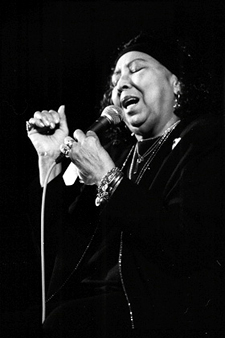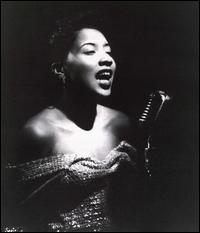Etta Jones
 Etta Jones was born on November 5, 1928, in Aiken, S.C. and died on October 16, 2001, in Mount Vernon, N.Y. Jazz vocalist Etta Jones recorded more than two dozen albums and earned three Grammy Award nominations during her six-decade-long career. Her popularity peaked in 1960 with the release of her single Don’t Go to Strangers, which climbed to number five on the R&B charts. In the late 1960s, Jones formed a duo with tenor saxophonist Houston Person, with whom she toured for the next 35 years. “All I want to do is work, make a decent salary, and have friends,” Jones told National Public Radio in a quotation cited in the Dallas Morning News. Although she never attained a level of stardom comparable to such jazz and blues greats as Aretha Franklin, Billie Holiday, and Dinah Washington, Jones had a devoted following of listeners and made her own unique mark on jazz history. As a three-year old she dreamed of becoming a singer and would pose in front of a mirror to mimic songs from the radio. Billie Holiday, who she saw in concert, and Thelma Carpenter, were two of her earliest influences. When Jones was 15 years old, she attended Amateur Night at the famed Apollo Theater in Harlem. Like jazz greats Ella Fitzgerald and Sarah Vaughn, her career began at the Apollo, though at first glance her debut did not seem promising.
Etta Jones was born on November 5, 1928, in Aiken, S.C. and died on October 16, 2001, in Mount Vernon, N.Y. Jazz vocalist Etta Jones recorded more than two dozen albums and earned three Grammy Award nominations during her six-decade-long career. Her popularity peaked in 1960 with the release of her single Don’t Go to Strangers, which climbed to number five on the R&B charts. In the late 1960s, Jones formed a duo with tenor saxophonist Houston Person, with whom she toured for the next 35 years. “All I want to do is work, make a decent salary, and have friends,” Jones told National Public Radio in a quotation cited in the Dallas Morning News. Although she never attained a level of stardom comparable to such jazz and blues greats as Aretha Franklin, Billie Holiday, and Dinah Washington, Jones had a devoted following of listeners and made her own unique mark on jazz history. As a three-year old she dreamed of becoming a singer and would pose in front of a mirror to mimic songs from the radio. Billie Holiday, who she saw in concert, and Thelma Carpenter, were two of her earliest influences. When Jones was 15 years old, she attended Amateur Night at the famed Apollo Theater in Harlem. Like jazz greats Ella Fitzgerald and Sarah Vaughn, her career began at the Apollo, though at first glance her debut did not seem promising.
Jones made her first recording, arranged by pianist Leonard Feather, in 1944. In subsequent years she performed and recorded with such jazz personalities as Pete Johnson, J. C. Heard, Kenny Burrell, Charles Brown, Milt Johnson, and Cedar Walton. In 1949, she started singing with Earl “Fatha” Hines, performing with his band for the next three years. Jones also attempted to launch a solo career, though she was not successful at first. She recorded sides with such labels as Black & White and RCA Victor, but these singles flopped. At the time, R&B was enjoying increased popularity, but Jones avoided this genre, preferring to sing jazz. This decision limited her audience and her exposure as an artist, and for a number of years she remained an obscure singer.
 Throughout the 1950s, Jones faced hard times and had to take day jobs occasionally to make ends meet, working as an elevator operator, an album stuffer, and a seamstress. She continued to perform sporadically, as opportunities arose. In 1956, Jones recorded her first full-length album, The Jones Girl… Etta … Sings, Sings, Sings, with King Records. But the album debuted with little fanfare and went largely unnoticed.
Throughout the 1950s, Jones faced hard times and had to take day jobs occasionally to make ends meet, working as an elevator operator, an album stuffer, and a seamstress. She continued to perform sporadically, as opportunities arose. In 1956, Jones recorded her first full-length album, The Jones Girl… Etta … Sings, Sings, Sings, with King Records. But the album debuted with little fanfare and went largely unnoticed.
In 1968, Jones formed a musical partnership that would change her career. She met Houston Person, a highly regarded tenor saxophonist, when she performed on the same bill as him at a Washington, D.C., nightclub. Jones and Person immediately hit it off, and they decided to tour together as a duo with equal billing, a partnership that would last for more than three decades. “They say … a lot of times singers and musicians don’t get along too well,” Jones told Billy Taylor of Billy Taylor’s Jazz at the Kennedy Center on National Public Radio in 1998, “but we got along famously.” Person became not only Jones’ collaborator but also–after 1975–her manager and record producer. Their connection was so close that some jazz aficionados have mistakenly assumed they were married, though they were not. Yet their rapport as musicians was unique, and they developed a conversational style with vocals and saxophone riffs. “[Person] knows exactly what I’m going to do,” the New York Times recalls Jones saying. “He knows if I’m in trouble; he’ll give me a note. He leaves me room.”
From the mid-1970s until her death in 2001, Jones and Person recorded 18 albums for the Muse label, which later became High Note Records. While these albums appealed to a relatively narrow audience of jazz aficionados, they occasionally contained minor hits attracting a wider group of listeners. In 1981, Jones received a Grammy Award nomination for her album Save Your Love for Me. A third Grammy nomination came in 1999 for her tribute to her former boss, My Buddy–Etta Jones Sings the Songs of Buddy Johnson.
After a battle with cancer, Jones died and was survived by her husband, John Medlock, two sisters, and a granddaughter (a daughter predeceased her). The day she died, High Note released her final recording, Etta Jones Sings Lady Day.

